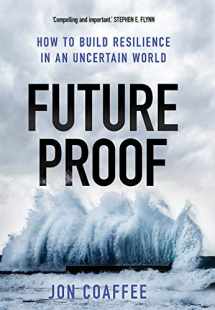
Futureproof: How to Build Resilience in an Uncertain World
ISBN-13:
9780300228670
ISBN-10:
0300228678
Author:
Jon Coaffee
Publication date:
2019
Publisher:
Yale University Press
Format:
Hardcover
288 pages
FREE US shipping
Book details
ISBN-13:
9780300228670
ISBN-10:
0300228678
Author:
Jon Coaffee
Publication date:
2019
Publisher:
Yale University Press
Format:
Hardcover
288 pages
Summary
Futureproof: How to Build Resilience in an Uncertain World (ISBN-13: 9780300228670 and ISBN-10: 0300228678), written by authors
Jon Coaffee, was published by Yale University Press in 2019.
With an overall rating of 4.5 stars, it's a notable title among other
Atmospheric Sciences
(Earth Sciences, Disaster Relief, Social Sciences, Public Affairs & Policy, Politics & Government) books. You can easily purchase or rent Futureproof: How to Build Resilience in an Uncertain World (Hardcover) from BooksRun,
along with many other new and used
Atmospheric Sciences
books
and textbooks.
And, if you're looking to sell your copy, our current buyback offer is $0.3.
Description
A compelling and definitive account of why we need to radically rethink our approach to dealing with catastrophic events
Catastrophic events such as 9/11, Hurricane Katrina, and the Tohoku "Triple Disaster" of earthquake, tsunami, and nuclear meltdown that hit the eastern seaboard of Japan in 2012 are seen as surprises that have a low probability of occurring but have a debilitating impact when they do.
In this eye-opening journey through modern and ancient risk management practices, Jon Coaffee explains why we need to find a new way to navigate the deeply uncertain world that we live in. Examining how governments have responded to terrorist threats, climate change, and natural hazards, Coaffee shows how and why these measures have proven inadequate and what should be done to make us more resilient. While conventional approaches have focused on planning and preparing for disruptions and enhanced our ability to "bounce back," our focus should be on anticipating future challenges and enhancing our capacity to adapt to new threats.
Catastrophic events such as 9/11, Hurricane Katrina, and the Tohoku "Triple Disaster" of earthquake, tsunami, and nuclear meltdown that hit the eastern seaboard of Japan in 2012 are seen as surprises that have a low probability of occurring but have a debilitating impact when they do.
In this eye-opening journey through modern and ancient risk management practices, Jon Coaffee explains why we need to find a new way to navigate the deeply uncertain world that we live in. Examining how governments have responded to terrorist threats, climate change, and natural hazards, Coaffee shows how and why these measures have proven inadequate and what should be done to make us more resilient. While conventional approaches have focused on planning and preparing for disruptions and enhanced our ability to "bounce back," our focus should be on anticipating future challenges and enhancing our capacity to adapt to new threats.


We would LOVE it if you could help us and other readers by reviewing the book
Book review

Congratulations! We have received your book review.
{user}
{createdAt}
by {truncated_author}


